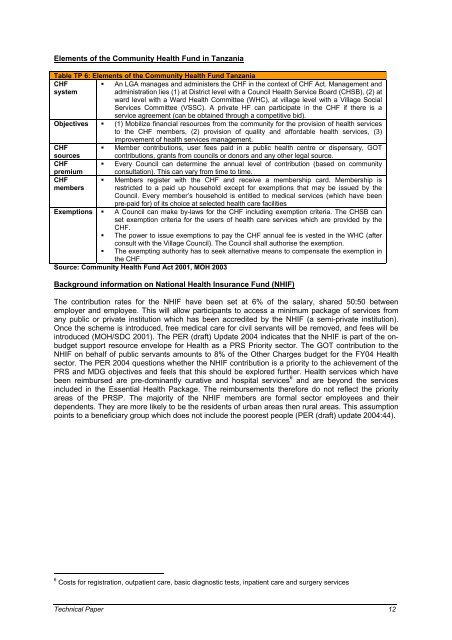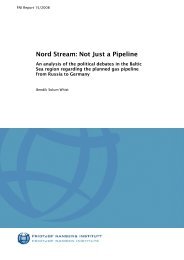equity implications of health sector user fees in tanzania
equity implications of health sector user fees in tanzania
equity implications of health sector user fees in tanzania
You also want an ePaper? Increase the reach of your titles
YUMPU automatically turns print PDFs into web optimized ePapers that Google loves.
Elements <strong>of</strong> the Community Health Fund <strong>in</strong> Tanzania<br />
Table TP 6: Elements <strong>of</strong> the Community Health Fund Tanzania<br />
CHF<br />
system<br />
� An LGA manages and adm<strong>in</strong>isters the CHF <strong>in</strong> the context <strong>of</strong> CHF Act. Management and<br />
adm<strong>in</strong>istration lies (1) at District level with a Council Health Service Board (CHSB), (2) at<br />
ward level with a Ward Health Committee (WHC), at village level with a Village Social<br />
Services Committee (VSSC). A private HF can participate <strong>in</strong> the CHF if there is a<br />
service agreement (can be obta<strong>in</strong>ed through a competitive bid).<br />
Objectives � (1) Mobilize f<strong>in</strong>ancial resources from the community for the provision <strong>of</strong> <strong>health</strong> services<br />
to the CHF members, (2) provision <strong>of</strong> quality and affordable <strong>health</strong> services, (3)<br />
CHF �<br />
improvement <strong>of</strong> <strong>health</strong> services management.<br />
Member contributions, <strong>user</strong> <strong>fees</strong> paid <strong>in</strong> a public <strong>health</strong> centre or dispensary, GOT<br />
sources<br />
contributions, grants from councils or donors and any other legal source.<br />
CHF � Every Council can determ<strong>in</strong>e the annual level <strong>of</strong> contribution (based on community<br />
premium consultation). This can vary from time to time.<br />
CHF � Members register with the CHF and receive a membership card. Membership is<br />
members restricted to a paid up household except for exemptions that may be issued by the<br />
Council. Every member’s household is entitled to medical services (which have been<br />
pre-paid for) <strong>of</strong> its choice at selected <strong>health</strong> care facilities<br />
Exemptions � A Council can make by-laws for the CHF <strong>in</strong>clud<strong>in</strong>g exemption criteria. The CHSB can<br />
set exemption criteria for the <strong>user</strong>s <strong>of</strong> <strong>health</strong> care services which are provided by the<br />
CHF.<br />
� The power to issue exemptions to pay the CHF annual fee is vested <strong>in</strong> the WHC (after<br />
consult with the Village Council). The Council shall authorise the exemption.<br />
� The exempt<strong>in</strong>g authority has to seek alternative means to compensate the exemption <strong>in</strong><br />
the CHF.<br />
Source: Community Health Fund Act 2001, MOH 2003<br />
Background <strong>in</strong>formation on National Health Insurance Fund (NHIF)<br />
The contribution rates for the NHIF have been set at 6% <strong>of</strong> the salary, shared 50:50 between<br />
employer and employee. This will allow participants to access a m<strong>in</strong>imum package <strong>of</strong> services from<br />
any public or private <strong>in</strong>stitution which has been accredited by the NHIF (a semi-private <strong>in</strong>stitution).<br />
Once the scheme is <strong>in</strong>troduced, free medical care for civil servants will be removed, and <strong>fees</strong> will be<br />
<strong>in</strong>troduced (MOH/SDC 2001). The PER (draft) Update 2004 <strong>in</strong>dicates that the NHIF is part <strong>of</strong> the onbudget<br />
support resource envelope for Health as a PRS Priority <strong>sector</strong>. The GOT contribution to the<br />
NHIF on behalf <strong>of</strong> public servants amounts to 8% <strong>of</strong> the Other Charges budget for the FY04 Health<br />
<strong>sector</strong>. The PER 2004 questions whether the NHIF contribution is a priority to the achievement <strong>of</strong> the<br />
PRS and MDG objectives and feels that this should be explored further. Health services which have<br />
been reimbursed are pre-dom<strong>in</strong>antly curative and hospital services 6 and are beyond the services<br />
<strong>in</strong>cluded <strong>in</strong> the Essential Health Package. The reimbursements therefore do not reflect the priority<br />
areas <strong>of</strong> the PRSP. The majority <strong>of</strong> the NHIF members are formal <strong>sector</strong> employees and their<br />
dependents. They are more likely to be the residents <strong>of</strong> urban areas then rural areas. This assumption<br />
po<strong>in</strong>ts to a beneficiary group which does not <strong>in</strong>clude the poorest people (PER (draft) update 2004:44).<br />
6 Costs for registration, outpatient care, basic diagnostic tests, <strong>in</strong>patient care and surgery services<br />
Technical Paper 12













